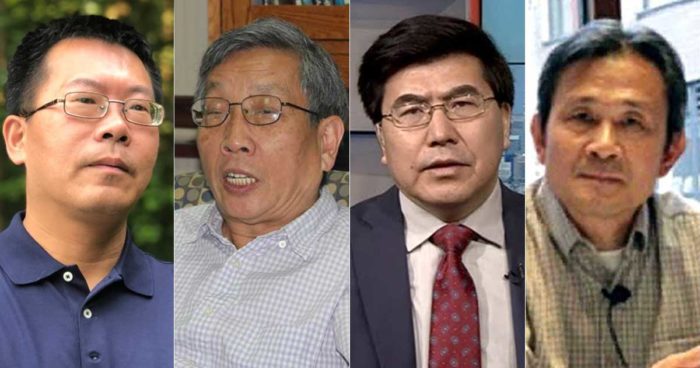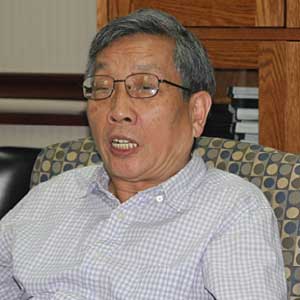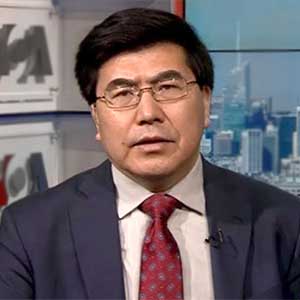
Overseas Chinese scholars said a new bipartisan bill on Tibet will have a profound impact. From left: Teng Biao, human rights scholar at Hunter College; Hu Ping, writer and editor-in-chief of Beijing Spring Magazine; Xia Ming, professor at City University of New York; and intellectual Ding Yifu.
Several overseas Chinese scholars contacted by the International Campaign for Tibet have declared that the new bipartisan bill on Tibet introduced in the US Congress will have a “profound impact” on the Tibet issue, helping to clarify the position of the United States and other democratic countries on the Tibet-China conflict.
The Promoting a Resolution to the Tibet-China Conflict Act was introduced in the House of Representatives by Congress members Jim McGovern, D-Mass., and Michael McCaul, R-Texas, on July 13, 2022. McGovern stated that he introduced the bill in the hopes of “getting the two sides to negotiate a durable solution,” while McCaul said the legislation “will help ensure Tibetans have a say in their own future.”
Reactions from Chinese scholars
Teng Biao

Teng Biao (Photo: University of Chicago)
“The Chinese government has completely trampled on international law, its own Constitution, violated the policy of regional ethnic autonomy, and has carried out a policy of brutal repression in ethnic minority areas, including Tibet,” Teng said. “The government has deprived the people of their freedom and basic human rights while implementing a policy of cultural genocide to restrict and eliminate the cultural, ethnic and religious identity of Tibetans.”
Teng welcomed the legislation, concluding that, “Under such circumstances, precision and clarity in the United States and other democratic countries’ position on the Tibet-China issue is particularly urgent and important for the basic human rights and political future of Tibetans.”
Hu Ping

Hu Ping (Photo: Voice of America Chinese)
Hu feels the bill not only helps to promote the cause of freedom for Tibetans, but also the cause of Chinese people, as well as global justice and peace. Hu added that the Dalai Lama’s Middle Way Approach is receiving increasing understanding and support from the Chinese people.
Xia Ming

Xia Ming (Photo: City University of New York)
Xia said, “The CCP’s tyranny in the traditional three provinces of Tibet for more than 70 years has completely obliterated any possible Chinese claim to legitimate rule.” He expanded that, “The existence of any modern state cannot be established by an authoritarian regime that imposes no accountability procedure on parts of the territory and its inhabitants under its jurisdiction, and the abusive and violent governance makes it completely delegitimized.”
He further said that the hope behind the bill is for the Chinese government to conform with “the demands of the Tibetan people, to follow the trend of history, and reach a solution to the Tibetan issue through peaceful dialogue.”
Ding Yifu

Ding Yifu (Photo: Kunga Tashi)
Speaking on the CCP’s heavy handedness and Sinicization policy in Tibet, Ding said, “Since the 1990s, the core of the CCP’s ‘strategy for governing Tibet’ has been a unilateral policy of assimilation, marginalizing the Tibetan language, and the so-called ‘Sinicization of Tibetan Buddhism.’ The implementation of such a policy is bound to be accompanied by high-handed tactics that go against the wishes of the Tibetans and suppress Tibetan culture. All kinds of human rights violations occur inevitably causing the Tibetan people to resent and resist, and arousal of serious concern in the international community.”
Sharing his thoughts on the identity of Tibetans and Chinese as distinct peoples, Ding commented that, “Both history and reality have proved that the Tibetan people are not the Chinese people, that Tibetan culture is different from Chinese culture, and that this strategy of governing Tibet by Sinicizing Tibet is untenable. The CCP will one day have to change its ways, abandon the policy of assimilation, respect the wishes of the Tibetan people, and respect the Tibetan people’s right to national autonomy. To this end, the CCP must first lift the blockade on Tibetans in exile abroad, hold dialogue with representatives of the Tibetan people, and sit down and negotiate with the Tibetan Government in Exile.”
What the bill does
The Promoting a Resolution to the Tibet-China Conflict Act will:
- Make it official US policy that the conflict between Tibet and China is unresolved and that Tibet’s legal status remains to be determined under international law
- Recognize that Tibetans have a right to self-determination—and that China’s policies preclude them from exercising that right
- Fault China for failing to meet expectations of participating in dialogue with the Dalai Lama or his representatives
- Reject as “historically false” China’s claim that Tibet has been part of China since ancient times
- Empower the Office of the Special Coordinator for Tibetan Issues to counter Communist Party propaganda about the history of Tibet, the Tibetan people and Tibetan institutions, including His Holiness the Dalai Lama
- Make clear that Tibet includes not only the so-called “Tibet Autonomous Region” of China but also Tibetan areas of Gansu, Sichuan, Qinghai and Yunnan provinces
Learn more about the Promoting a Resolution to the Tibet-China Conflict Act.
Watch ICT’s live Tibet Talk on the new legislation Wednesday, July 27 at 12 noon EDT/9 am PDT. Email your questions for our speakers to [email protected] or share them on social media using #TibetTalk.

